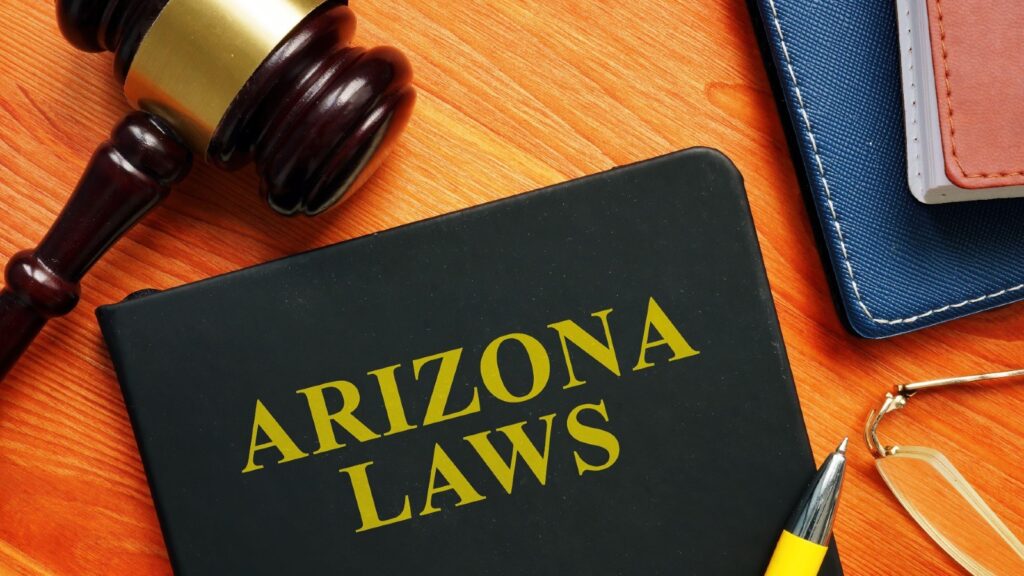Arizona Judge Denies Injunction Over Sports Betting Launch

Promo Code: BOOKIES
Must be 21+ to participate (18+ in KY). Gambling problem? Call 1-800-GAMBLER (CO, IL, IA, KY, KS, LA, MD, MO, NC, NJ, OH, PA, TN, VA). Call 1-800-NEXT-STEP (AZ). Call 1-800-9-WITH-IT (IN). CALL 1-877-770-STOP (LA). Must be present in LA (select parishes). Licensee partner Amelia Belle Casino. Minimum $10 deposit required. Minimum odds -500 or greater. Bonus Bets wager excluded from returns. New customers only. T&Cs, time limits and exclusions apply.
A Superior Court judge ruled Monday that sports betting in Arizona can proceed, but an appeal is expected in the case.
Judge James Smith denied a request by the Yavapai-Prescott Indian Tribe for an injunction to delay the launch of sports betting on Thursday.
Smith wrote in his ruling that “the Tribe did not show that H.B. 2772 likely violates the Tribe’s rights regarding event wagering as compared to Sports Franchise Owners. The Tribe did not show that public policy favors its requested injunctive relief. IT IS ORDERED denying the Tribe’s Motion for a Temporary Restraining Order and a Preliminary Injunction.”
Earlier Monday (9 a.m. Arizona time), Smith oversaw a 69-minute hearing in Maricopa County Superior Court on the suit filed by the tribe. The judge had questions for attorneys from each side, but he asked tribe attorney Nicole Simmons specifically about how the tribe would be harmed financially (and if they had done a revenue analysis), and why it believed Proposition 202 limited future gaming.
Simmons responded that gaming could change lawfully, “but it has to be lawful,” and that an expansion of gaming needed voter approval.
Smith noted that Proposition 202 has a provision that allows tribe to reduce its financial obligations to the state and could engage in other forms of gambling if there were changes to gambling laws in Arizona.
Promo Code: BOOKIES
Must be 21+ to participate (18+ in KY). Gambling problem? Call 1-800-GAMBLER (CO, IL, IA, KY, KS, LA, MD, MO, NC, NJ, OH, PA, TN, VA). Call 1-800-NEXT-STEP (AZ). Call 1-800-9-WITH-IT (IN). CALL 1-877-770-STOP (LA). Must be present in LA (select parishes). Licensee partner Amelia Belle Casino. Minimum $10 deposit required. Minimum odds -500 or greater. Bonus Bets wager excluded from returns. New customers only. T&Cs, time limits and exclusions apply.
Anni L. Foster, representing Gov. Doug Ducey, pointed out that the tribe was trying to “turn the clock backward so they can get a do-over” in regard to the injunction while not specifically citing financial harm to the tribe. She also pointed out that the tribes and pro franchises are treated equally in the law.
Smith did ask Foster about the PGA Tour and NASCAR, and whether other entities would be able to host events in the state and be able offer sports betting.
Judge Recognizes Urgency
The fact the hearing occurred on a holiday and that
there was likely to be an appeal no matter how he rules, underlies the importance of a decision before Thursday. {{TOPLIST_7ae193d06cbf718a5d2467bdda7b83dd}}
“My goal is to, if at all possible, get something out to you Monday night so that you'll know what the ruling is,” Smith said last Thursday during a hearing that set the Monday proceedings. “And then you can move on to the appellate level."
Despite Smith’s urgency, having an appeal heard by the time sports betting sites go live in Arizona on Thursday will require an extremely quick turnaround.
The Yavapai-Prescott tribe, which was not part of the new gaming compacts and did not receive one of 10 sports betting licenses issued to tribes, seeks to overturn the state law that legalized sports betting at off-reservation sites. It owns Bucky’s Casino and the Yavapai Casino, both in Prescott, about two hours north of Phoenix.
Promo Code: BOOKIES
Must be 21+ to participate (18+ in KY). Gambling problem? Call 1-800-GAMBLER (CO, IL, IA, KY, KS, LA, MD, MO, NC, NJ, OH, PA, TN, VA). Call 1-800-NEXT-STEP (AZ). Call 1-800-9-WITH-IT (IN). CALL 1-877-770-STOP (LA). Must be present in LA (select parishes). Licensee partner Amelia Belle Casino. Minimum $10 deposit required. Minimum odds -500 or greater. Bonus Bets wager excluded from returns. New customers only. T&Cs, time limits and exclusions apply.
The lawsuit was filed against Ducey and Department of Gaming Director Ted Vogt. Over the weekend, two Arizona tribes that received sports betting licenses sought to intervene in the motion for a preliminary injunction.
The launch of online sportsbooks in Arizona is scheduled for 12:01 a.m. local time on Thursday, making them live for NFL betting.
Since Aug. 28, sportsbook operators in the state have been enticing bettors with sportsbook promo codes.
Promo Code: BOOKIES
Must be 21+ to participate (18+ in KY). Gambling problem? Call 1-800-GAMBLER (CO, IL, IA, KY, KS, LA, MD, MO, NC, NJ, OH, PA, TN, VA). Call 1-800-NEXT-STEP (AZ). Call 1-800-9-WITH-IT (IN). CALL 1-877-770-STOP (LA). Must be present in LA (select parishes). Licensee partner Amelia Belle Casino. Minimum $10 deposit required. Minimum odds -500 or greater. Bonus Bets wager excluded from returns. New customers only. T&Cs, time limits and exclusions apply.
Two AZ Tribes Prepared to Fight Suit
The Tonto Apache and Quechan Tribes in Arizona are fighting the Yavapai Prescott Indian tribe’s effort to delay the start of sports betting this week. According to a news release over the weekend, the tribes have filed a notice “of intent to intervene in the legal action, and will also pursue a motion to dismiss as needed.”
The Tonto Apache tribe, in Payson, operates the Mazatzal Casino. The Quechan tribe of the Fort Yuma reservation in Yuma, operates the Paradise Casino. Both were awarded sports betting licenses under the new law.
"The truth is that we spent five years in painstaking, good-faith negotiations with the governor and the Department of Gaming to protect our interests and ensure that our amended compact provides the best possible economic benefits for our people," Tonto Apache Chairman Calvin Johnson said in the release. "We sought to engage Yavapai leaders in developing strategies that would benefit small, like-minded tribes like ours, but they declined, saying they would simply sue if they were unhappy with the outcome of negotiations."
Promo Code: BOOKIES
Must be 21+ to participate (18+ in KY). Gambling problem? Call 1-800-GAMBLER (CO, IL, IA, KY, KS, LA, MD, MO, NC, NJ, OH, PA, TN, VA). Call 1-800-NEXT-STEP (AZ). Call 1-800-9-WITH-IT (IN). CALL 1-877-770-STOP (LA). Must be present in LA (select parishes). Licensee partner Amelia Belle Casino. Minimum $10 deposit required. Minimum odds -500 or greater. Bonus Bets wager excluded from returns. New customers only. T&Cs, time limits and exclusions apply.
Quechan President Jordan Joaquin said that “it is very unfortunate to see the Yavapai seek to unravel all this progress after they chose to sit on the sidelines during our compact amendment negotiations."
"We invested hundreds of thousands of dollars and an extraordinary amount of work to secure our mobile wagering license, which will open up considerable new opportunities for our tribe," Joaquin said in the release. "It is very unfortunate to see the Yavapai seek to unravel all this progress after they chose to sit on the sidelines during our compact amendment negotiations."
About the Author


 Best Horse Racing Free Bets February 2026: Get Over £1,600 Free Bets Horse Racing This Weekend
Best Horse Racing Free Bets February 2026: Get Over £1,600 Free Bets Horse Racing This Weekend  Cheltenham Festival Banker Acca 2026: Cheltenham Accumulator Tips
Cheltenham Festival Banker Acca 2026: Cheltenham Accumulator Tips  Arsenal Premier League Odds: How Much Could Gunners Win Title By?
Arsenal Premier League Odds: How Much Could Gunners Win Title By?  Britain's Got Talent 2026 Odds - Which Type Of Act is Most Likely To Win?
Britain's Got Talent 2026 Odds - Which Type Of Act is Most Likely To Win?  Best Las Vegas NRL Betting Sites, Odds and Tips: Knights vs Cowboys and Bulldogs vs Dragons
Best Las Vegas NRL Betting Sites, Odds and Tips: Knights vs Cowboys and Bulldogs vs Dragons  Betfair Casino No Deposit Free Spins February 2026: Claim 100 Free Spins
Betfair Casino No Deposit Free Spins February 2026: Claim 100 Free Spins
Comments